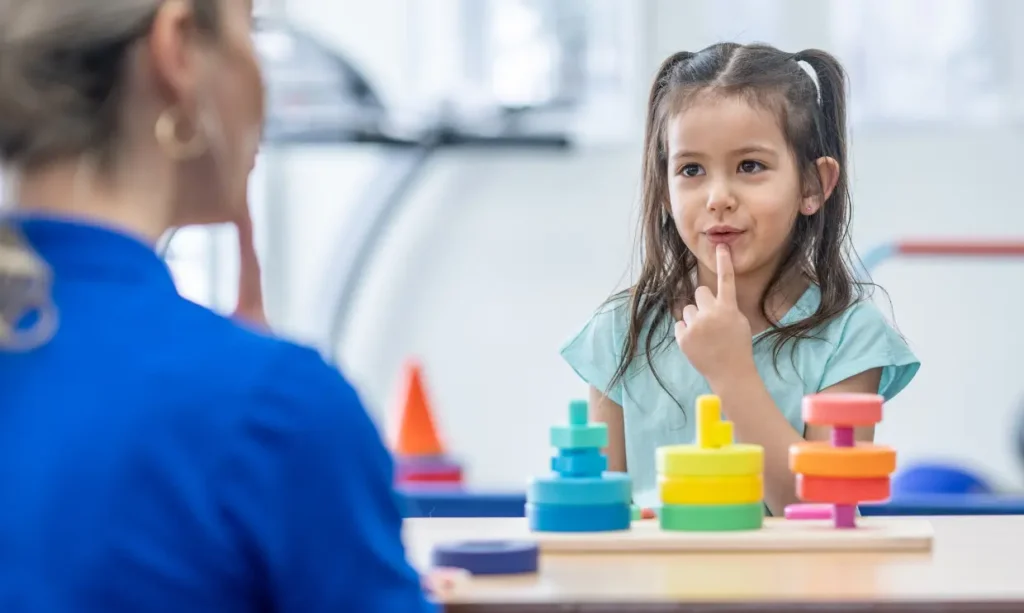Working with early intervention specialists creates powerful partnerships that accelerate children’s communication development. Clear communication between families and specialists ensures therapy continues at home effectively. The “wait and see” approach often misses critical developmental windows when intervention works best. Family involvement transforms parents into co-therapists who reinforce learning daily. Regular progress monitoring helps adjust strategies to maintain steady advancement toward communication goals.
Building Powerful Family-Specialist Partnerships
Early intervention speech therapy achieves remarkable success when families and specialists work together as unified teams dedicated to children’s communication development. This collaborative partnership forms the foundation for long-term developmental achievements that extend far beyond initial therapy goals. Jill Dews, who founded Let’s Talk Speech and Language Therapy in Mission Viejo in 2002, has witnessed firsthand how effective family-specialist partnerships transform children’s communication abilities and overall confidence.
Clear, consistent communication from specialists helps families understand their child’s needs and progress in accessible language. Regular meetings provide opportunities to discuss advancement, address concerns, and adjust strategies based on each child’s evolving abilities. This transparency makes speech therapy less mysterious and empowers families to become active participants in their child’s growth journey.
Strategic training enables parents to continue therapeutic practices during daily routines and interactions. When specialists teach families specific techniques for fostering language development during playtime, meals, and bedtime activities, therapy extends beyond clinical sessions into every aspect of the child’s life.
Why “Wait and See” Risks Progress
Addressing speech and communication challenges requires immediate action rather than hoping problems will resolve naturally over time. The “wait and see” approach often results in missed opportunities during critical developmental periods when intervention produces the most significant and lasting improvements.
Critical brain development windows emphasize the urgent need for early therapeutic intervention. When treatment gets delayed, children may struggle to reach foundational speech and language milestones that support cognitive development, academic achievement, and social interaction abilities. These delays can create cascading effects that impact multiple areas of development.
Early intervention prevents children from developing ineffective coping strategies that become difficult to modify later. Without structured therapy guidance, children often create their own ways of dealing with communication challenges. These self-developed strategies may provide temporary solutions but can actually hinder long-term language acquisition and communication skill development.
All Children Benefit from Early Support
Early intervention services benefit children across the entire spectrum of communication challenges, not just those with the most severe difficulties. This inclusive approach recognizes that even mild communication concerns can significantly impact children’s development when left unaddressed during critical learning periods.
| Severity Level | Early Intervention Benefits | Long-term Impact |
| Mild challenges | Prevents escalation to more complex issues | Stronger academic foundation |
| Moderate difficulties | Accelerated improvement with targeted support | Better social communication skills |
| Severe concerns | Maximum progress during optimal brain development | Enhanced independence and confidence |
| Subtle issues | Addresses problems before they become ingrained | Prevents future learning challenges |
| At-risk factors | Proactive support prevents potential delays | Optimal developmental trajectory |
Children experiencing mild communication difficulties often show remarkable progress through early therapy that prevents problems from escalating into more pronounced challenges. For example, a child with subtle articulation concerns may achieve complete resolution through early intervention, while delayed treatment might require years of more intensive therapy.
Inclusive early intervention programs create tailored approaches that adapt to each child’s unique developmental profile. This personalized attention fosters supportive environments where all children can grow and learn according to their individual needs and capabilities in Mission Viejo and throughout Orange County.
Maximizing Family Impact on Success
Active family participation forms the cornerstone of successful early intervention outcomes. When families understand their crucial role and receive appropriate support, they become powerful advocates and co-therapists who significantly enhance their child’s communication development progress.
Family involvement extends therapy into home environments where children spend most of their time. Daily interactions and routine activities provide countless opportunities to reinforce therapeutic strategies in familiar, comfortable contexts. Parents can integrate speech exercises into storytelling, mealtime conversations, and play activities that feel natural rather than clinical.
Here are effective ways families can support their child’s intervention goals:
- Practice recommended exercises during daily routines and activities
- Use specific language techniques suggested by specialists during conversations
- Create communication-rich environments that encourage speech attempts
- Celebrate small victories and maintain positive attitudes about progress
- Attend therapy sessions when possible to learn new strategies
- Communicate regularly with specialists about observations and concerns
Co-therapist mindsets help families actively implement speech and language strategies rather than passively waiting for weekly sessions to create change. This might involve using specific communication prompts identified by specialists or creating structured practice opportunities throughout each day.
Creating Strong Communication Channels
Strategic partnerships between families and specialists depend on open communication, shared therapeutic efforts, and collaborative environments that value family input and observations. These relationships create unified approaches that maximize intervention effectiveness and support children’s comprehensive development.
Regular discussions about therapy plans and progress help families understand the reasoning behind each strategy and technique. When specialists explain their approaches in clear, accessible language, families can consistently reinforce these practices at home, creating seamless learning experiences for children.
Shared therapeutic application occurs when families actively use strategies learned from specialists during everyday situations. Simple practices like incorporating target sounds into play activities or using visual cues during conversations can significantly enhance therapy effectiveness while building family confidence.
Collaborative environments welcome family insights and observations that help tailor therapy to each child’s unique needs. When specialists value parental input about their child’s interests, challenges, and successes, treatment becomes more personalized and effective.

Recognizing When Strategies Need Adjustment
Regular reassessment of intervention approaches ensures that therapy remains effective as children grow and develop new needs. Specific indicators can signal when current methods require modification to maintain steady progress toward communication goals.
Progress plateaus may indicate that existing techniques are no longer appropriate for the child’s current developmental stage. When articulation improvements stall over several sessions, specialists should evaluate whether alternative approaches or more advanced exercises might better serve the child’s evolving needs.
New developmental concerns that emerge during therapy require expansion of intervention strategies. If a child initially receiving articulation support begins showing language comprehension difficulties, the treatment plan should broaden to address these additional challenges comprehensively. Persistent challenges despite consistent therapeutic efforts may suggest incomplete understanding of the child’s needs.
Building Support Networks for Families
Well-rounded support systems extend the benefits of early intervention beyond direct therapy sessions to include professional guidance, community connections, and educational resources. Each component plays vital roles in reinforcing therapeutic progress and supporting family confidence throughout the intervention journey.
Professional guidance provides customized roadmaps for each child’s unique therapy needs. Specialists serve as advisors who guide families through intervention complexities while teaching strategies that bridge clinical sessions with daily life interactions.
Community support groups offer emotional solidarity and practical advice from families facing similar challenges. These connections help parents realize they are not alone while providing forums for sharing successful strategies and learning from others’ experiences. Educational resources including books, apps, and interactive tools enable continued learning beyond therapy appointments.
Implementing Proactive Strategies
Effective early intervention relies on proactive approaches that prevent challenges while improving developmental outcomes. Structured methods focusing on realistic expectations, strength-based interventions, and culturally sensitive practices create foundations for lasting success.
Clear, realistic expectations help align family and specialist goals while providing appropriate timelines for developmental milestones. When specialists explain anticipated progress patterns, families can better understand their child’s journey and maintain motivation during challenging periods.
Strength-based interventions build on each child’s natural abilities while addressing areas of need. If a child demonstrates strong vocabulary skills, therapists can design activities that leverage this strength while simultaneously targeting articulation or other challenging areas. Culturally sensitive practices ensure that all families feel valued and understood throughout the intervention process.
Achieving Success Through Collaboration
Early intervention success depends on dynamic collaboration between informed families and skilled specialists working toward shared goals. This partnership creates comprehensive support systems that address children’s communication needs while building family capacity for continued growth and development.
Strategic approaches tailored to individual needs overcome barriers through education and clear communication pathways. When families understand their child’s specific challenges and the therapeutic techniques being used, they can provide consistent support that facilitates smoother developmental progress.
Extended support networks amplify intervention impacts by connecting families with resources, groups, and materials that reinforce therapeutic learning. Ready to build a powerful partnership with an early intervention specialist who will support your family’s journey toward communication success? Let’s Talk Speech and Language Therapy in Mission Viejo offers comprehensive early intervention services that prioritize family collaboration and evidence-based practices. Jill Dews brings her Master’s degree from Cal State Long Beach and extensive experience in Orange County schools to create personalized intervention plans that work for each child and family.
Let’s Talk Speech and Language Therapy
27285 Las Ramblas, Suite #210
Mission Viejo, California 92691
(949) 218-0508
Driving Directions
Jill Dews, M.A., CCC-SLP
CA License #: SP12461
Link to Verify License
Frequently Asked Questions
How does working with an early intervention specialist help my child?
Partnering with an early intervention specialist provides your child with personalized support during critical developmental stages when their brain is most receptive to learning new communication skills. Specialists create targeted strategies that address your child’s specific needs while teaching you techniques to reinforce progress at home. This collaborative approach leads to faster improvement and increased confidence in communication abilities.
What role do families play in early intervention therapy?
Families serve as essential partners who extend therapy into daily life through consistent practice and reinforcement of learned strategies. Parents become co-therapists who apply specialist-recommended techniques during routine activities like meals, play time, and conversations. This family involvement provides children with continuous opportunities to practice new skills in comfortable, familiar environments.
How can I ensure we’re choosing the right intervention specialist?
Look for specialists with appropriate credentials, experience with children who have similar needs to your child, and communication styles that make you feel comfortable and understood. The right specialist should clearly explain their approach, welcome your questions and observations, and demonstrate genuine care for your child’s success. Trust your instincts about whether the specialist connects well with your family.
Related Articles





